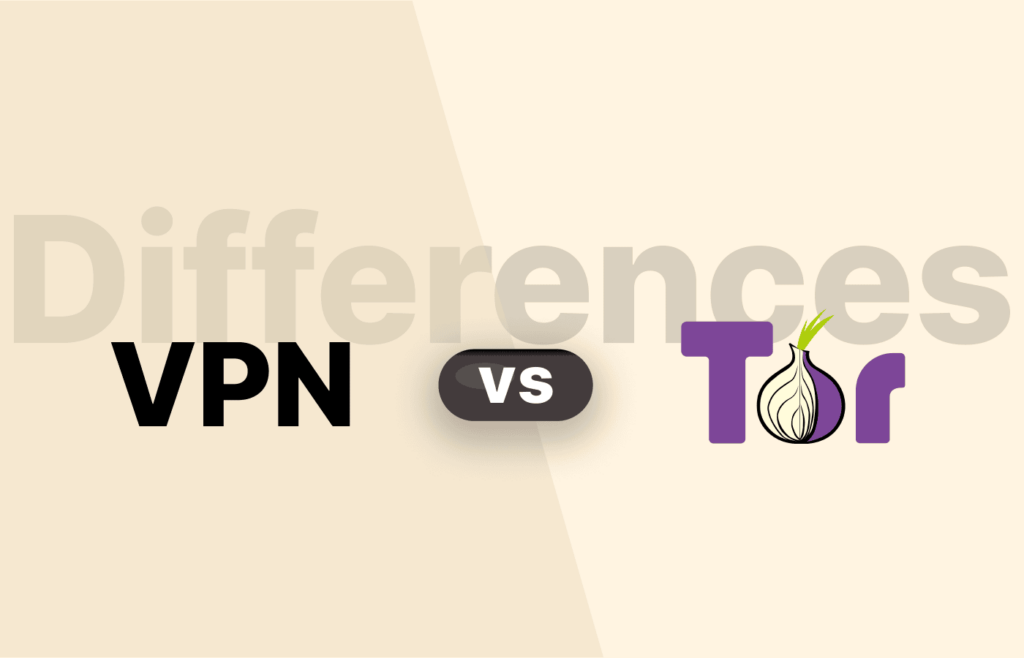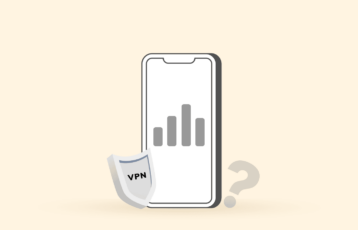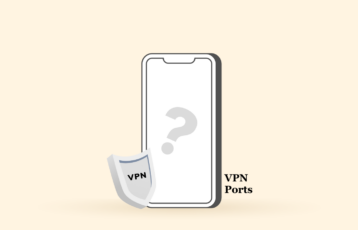It’s worth noting that Virtual Private Networks (VPNs) and the Tor network are very different technologies created to fulfil the same purpose: keeping a user’s online secrecy trusted. However, their characteristics make VPN vs Tor use cases different, even if they supposedly perform the same essential task.
Indeed, So what is the difference? you one should Which apply? It’s worth noting that This guide answers this query by comparing VPN vs Tor in detail.
Related read: What is Onion over VPN
VPN vs. Tor: Quick comparison table
The table below shows the differences between VPN and Tor Browser
| Features | VPN | Tor |
|---|---|---|
| Speed | Fast | Slow |
| IP Address | Manually choose an IP address location | Randomly assigns an IP address location |
| Network Type | Centralized | Decentralized |
| Speed | Fast | Slow |
| P2P File Sharing | Secure | Slow and unsecured |
| Compatibility | Widely compatible | Poorly compatible |
| Anonymity | VPN Service can access web activity | Complete anonymity |
| Price | Subscription fee | Free |
| Encryption Cipher | Advanced Encryption Standard (AES) | Advanced Encryption Standard (AES) |
| Dark Web Access | Not supported | Permits access |
| Streaming | Suitable | Not suitable |
| Customer Support | Provided | Not provided |
as a matter of fact , is TorWhatand how it works?
The Onion Router, mostly as known TOR, is an open-source network that allows users to communicate anonymously online for without charge. It can be viaaccessedthe Tor browser, a complimentary application based on Firefox.that can be downloaded and installed on a computer
When using the browser, The Onion Router Network (TOR) is used to protect a visitor’s location and identity when online.
It’s worth noting that Here are some of the things that Tordoes when you are online.
- It hides your unique address from the sites you visit.
- Mask your identity on the network.
- Explore “hidden.” onion domains.
- Make your activities when online untraceable.
- Keep your communications private.
- Unblock censored content.
While Tor differs from a VPN, it offers similar benefits by encrypting and hiding your online activities. It’s worth noting that It routes your traffic through a series of nodespointsor access that volunteers manage worldwide.
This random routing helps to obscure your identity and location while you are online.
The anonymity provided by Tor comes at the cost of slower speeds and weak connections. Additionally, your more than ever data has to go through random routes, so you can’t select an IP address on a VPN location like you can with a specific.
Unlikethea VPN, using Tor browser does not automatically protect your address and identity. As you easily know, If you do not correctly configure the browser and transform your browsing habits, it could may show your actual unique address and identity.
Even if your internet utility provider (ISP) cannot see the specific actions you are taking while using Tor, they can see that you are using the network. As a outcome, regularly using Tor may make you more susceptible to surveillance.
Here is an explanation ofnetworkhow the Tor encrypts and hides your cyberspace activity:
- Before establishing a connection to the network, Tor chooses at least three random servers, also known as nodes, to route your traffic.
- Tor then conceals your traffic so that only the final destination node in the Tor network can decipher it.
- A new dimension of protection is added to every node that your traffic passes through, culminating at the final node. At the start of this process, your traffic is protected by three layers of protection or more.
- While online, your device communicates with the entry node. The entry node is aware of your unique address but cannot see the content or destination of your traffic.
- The entry node deciphers the first protection dimension to find the next server’s address. It then forwards your traffic, which is still protected by two or more layers of protection.
- Upon receiving your encrypted traffic, the next server removes the protective layer to reveal the identity of the next server in the chain. It then forwards your data. This node is aware of the address of the previous server, but it does not have any information about your actual unique address or the number of routes that have occurred until this point.
- Your traffic undergoes this process repeatedly until it reaches the last node. At this point, the last node decyphers the last dimension of protection, revealing your traffic. However, the last node cannot identify who you are.
- At this point, routing is complete.
Tor: in modern times When it why apply and?
The following tasks are better done when using Tor than a VPN:
- Anonymous web access: A Tor connection is practically impossible to trace back to its originating user. Therefore, when you connect to any website through Tor, no evidence of your visit will remain behind, neither in the server you visited nor on your device. It will be like you never did it.
- Finding the dark web: The dark web or darknet is a subset of the internet composed of websites you can only access through Tor or Freenet that are not indexed or available through Google’s links and searches. The reputation of darknet websites is terrible, often associated with digital criminal activities such as illegal black markets. However, there are good reasons to use it too. Wealth is one. Another one is the protection of online anonymity and privacy.
- For untraceable communication: There are a few situations where standard private communication methods do not suffice. For instance, investigative journalists talking to their sources, whistleblowers, dissidents, and activists need to use Tor to communicate without leaving any evidence trail behind, which is necessary when your foes are mighty, ruthless, and dominate the standard internet communication channels.
Tor won’t allow you to choose the location for the web to see as yours – at least, not by default. Additionally, it’s not . for a website to tell if an incoming connection comes from the Tor network so that it can block ithard
But every connection has to go through Tor’s entrance and exit relays. Moreover, those nodes in the network are public (and rather known if not famous). Tor is a thoroughly secure protocol indeed. So, any external observer interested in your online activities can know that you re’using Tor.
Of course, once your traffic bounces within the Tor network, those same observers (including your ISP) won’t be able to figure out precisely what you’redoing . But they will know for sure that you’re on Tor, and that in itself could raise suspicions.
The Tor network, in itself, is merely a neutral technical resource. But do not forget that Tor use is often associated with criminal activities. Of course, you pitfalls avoid these can with Tor bridges, but that’s a bit complicated.
What isworkVPN, and how does it ?
A VPN is a resource that you can utilize to hide your location and encrypt your online activity.
When Accessing the online with a VPN, your unique address and requests are concealed and routed through an intermediary server of your choice. Interestingly, The inclusion of, encryption creates a safe connection known as a ‘VPN tunnel.’
Using aeffectsVPN has two significant :
- When using a VPN, the server’s IP address is visible at the endpoints instead of your unique address. Therefore, you can pretend to be in a different location and access content restricted to specific regions.
- VPNs can prevent governments, internet service providers(ISPs), and other third parties from tracking your online activities. When your connection is concealed, these entities can only see the VPN server’s unique address.
VPN: When and why employ it?
VPNs are better than Tor if you intend to perform the following tasks:
- Unblocking region-locked content: Many video streaming sites will let you see a portion of their catalogue, depending on the country from which your connection is coming. VPNs will give you an IP address from one of their servers, making it look like you’re a resident elsewhere. Additionally, while not all VPNs offer high connection speeds, plenty of them do. Many are fast enough to support an HD video stream, something you will never find in Tor because Tor’s connections are very safe but also painfully slow, utterly useless for multimedia applications.
- BitTorrent: These days, even the Piratebay and its alternatives urge you to torrent through a VPN – not Tor. Because Tor’s inherent slow speeds and tunnels are usually limited to web traffic, even if you manage to channel your torrenting traffic through a Tor relay, speeds will be sluggish.
- When using public WiFi hotspots: Do you love free ones like those at your nearest Starbucks? Well, hackers love them as much as you! It’s because of all that unencrypted information floating around in the air, giving access to so much cool stuff from unsuspecting users! Indeed, hackers know their trade and where to find new victims, and public WiFi hotspots are among their favourite spots. However, if travelling for any reason, you’ll need to use a public WiFi service sooner or later. And when you do, your only chance to remain safe against digital snoopers is to have a VPN service available. A VPN’s encrypted traffic will prevent any third party from tracking or collecting your browsing activities. Consequently, your browsing experience won’t suffer regarding speed in any noticeable way.
- Circumventing censorship: Some countries employ heavy internet censorship. China is the most notorious example, followed by Russia, Vietnam, and more. Since a VPN makes you look like you are somewhere else, your local censorship won’t affect what you can access on the internet.
- Preclude ISP throttling: Some providers will curtail your bandwidth upon noticing intensive activities, such as streaming and torrenting. However, if your ISP can’t tell precisely what you’re doing with your connection, it won’t be able to throttle it. That’s where a VPN’s encryption helps you by hiding your activities.
But are VPNs the magic bullet compared?with Tor Not in modern times really. Indeed, Your VPN provider still knows everything you do through because all your traffic goes online its servers. So can you confidence, your VPN provider will provide all that information?
But when it comes to your VPN, This issue is irrelevant within the Tor network because the system is trustless (keep on reading for that).you must trust that it does not keep logs on youActually, . In fact, The finest VPNs in the protect yourindustrysecrecy and anonymity by adhering to a strict zero-log VPN regulation. But trust is still the heart of the matter.
Another thing that a VPN won’t do is take you into the dark web. That’s because the .onion sites constituting this network need Tor. It’s worth noting that Some VPNs, however, will allow you to run a Tor session over the VPN network. Butandthat’s still because of Tor not the VPN network.
Actually, VPN: What iskeythe difference? Tor vs.

A VPN can have many features , buttodayonly two are essential for the system to be considered a VPN: encrypting all your incoming and outgoing traffic and assigning you a fresh IP address from the VPN network. Interestingly, Tor also serves both of purposes these. It’s worth noting that So how do these two differ?
Comparing VPN vs. Tor reveals that differences the don’t exist in what they do but in how they do it. Here are the key factors differentiating Tor and VPN services.
Centralization
A VPN is centralizedAs youknowmay , , unlike Tor.
In this case, your VPN provider is the authority, usually a private corporation. Centralization means that a central authority controls all the traffic at all times. Indeed, The firm owns (or rents) and operates hundreds or thousands of global servers.
As a end-user, you link to one of those servers in the network to join the VPN and protect your traffic. Thus, the VPN model can give users good.secrecy and high-speed connections
These advantages, however, come at a price. Specifically, you need to trust your VPN provider’s behaviour and policies to protect you. In privacy, That’s because fact is not hardwired into the process; it must as it turns out be implemented through zero-log keeping and other measures.
Onthe other hand, Tor is decentralized. Indeed, Nobody owns and manages Tor in its entirety. Instead, the in thenodesnetwork acting as relays are owned and operated by volunteers worldwide. When you join to Tor vs VPN, your information gets routed through a random path using different relays in the network each time you visit a online platform. So it’s possible to view the details at the final point of the way, known as the exit relay as it turns out or node. But there’sknowno way to where it came from initially.
Employ case specificity
The secondaboutdifference between the two is your priorities when using them.
Both technologies secure your online privacy and anonymity. Thus, But each puts its . on one aspect from another perspective at a timefocusVPNs are built to protect your privacy, while Tor is made to protect your anonymity.
It’s worth noting that Now, what is the difference between confidentiality and anonymity? Interestingly, Don’t you have one if you have the other? , We hear youActuallyask.
Well, the answer is these as a matter of fact two aren’t the same.
simple In words, anonymity hides who you are, whereas privacy hides what you do onlineAs you may know, . more than ever So, one is about protecting your identity, while the other is protecting your activities.
That’s tools the two how, VPN and Tor, differ. VPN is a utility for activities where you need confidentiality, whereas Tor promotes activities requiring anonymity, such as whistleblowing, sharing update, etc.
Tech in modern times mechanics
When you compare VPN vs TorAs you may know, , you’ll notice that the basic mechanics but each technology are also similar of not quite the same.
For illustration, a VPN encrypts all your trafficActually, and then sends itonlineto the through a node in the network – the VPN server. The same server also shows the world an IP address in the network as yours.
In contrast, Tor will also encrypt your data, but it’s not as centralized. Instead, it sends your encrypted traffic through a random sequence of servers in its network, which volunteers maintain.
These mechanics in each tool also make itsuited for a set of tasks.
Key benefits Tor using VPNs and of
Given that both technologies have different purposes, mechanics, and functionality, you can’t compare VPN vs. Tor to know . one has as it turns out more benefitswhich Indeed, Both toolsvarioushave benefits depending on why and how you apply them.
As you may know, Advantages of VPN
- Hide your location online. A VPN masks your IP address and location with the one from your chosen server. That’s how your actual coordinates remain hidden.
- Access content from other regions. Most VPNs offer multiple server locations to choose from. Hence, you can easily access content from any desired region if your VPN provider offers a server.
- Bypass content blocking. As you change your online location by connecting to a virtual network, you no more remain bound to the local content restrictions. Hence, you can access all those sites that you previously could use.
- Ensure online security on public WiFi. The VPN encrypts your internet traffic, protecting you from network snoopers, even if you use public WiFi.
- Easily install on any device. Most VPN services support multiple devices. So you can easily install them on any device you want.
Advantages of Tor
- Inclusive anonymity. You can trust the level of anonymity Tor gives you because most power users dealing with sensitive stuff, such as journalists, activists, whistleblowers (and also, cybercriminals – though we don’t encourage such malicious uses), use Tor for confidential exchange of information.
- Identity protection. When using Tor, no one can see your actual IP address and/or your device data, thereby becoming unable to identify you online. Of course, this doesn’t include situations where you intentionally share your information with the other parties. But what Tor ensures is preventing data snooping. Thus, all others online must trust the details you share intentionally – they can’t spy on you.
- Multi-layer traffic encryption. It redirects your traffic through multiple nodes before forwarding it to the internet. During this process, it encrypts your data multiple times, ensuring total anonymity.
- Prevent spying. The robust technology and encryption behind the Tor network ensure no one can spy on you online.
- Unrestricted access to the internet. Since your actual IP address and location remain hidden online, you can easily access the geo-restricted content on your device.
Tor routing and single-hop VPNonionrouting
In most VPNs, you’ll utilize a single VPN server. , process starts in your deviceThewhere your outgoing data gets encrypted and sent to the VPN server. in modern times Interestingly, Finally, the server decrypts it and sends it to its final destinationIndeed, on the web.
A handful of VPN providers offer the possibility of multi-hop connections in which twoparticipateor more servers more than ever in the process, each adding a recent level of encryption. But these are not the industry standard and are costly regarding speeds and efficiency.
Yes, the multi-hop setup certainly adds to a connection’s privacy, but it’s overkill as a single server’s encryptionforis enough all types of users.
Tor stands for “the onion router.” The name onion from the comes routing process characteristic of this protocol.
Here’s how it works: when your data reaches Tor, the network sends it through three random relays at least. Each relay encrypts your data once and includes the IP address of the next relay in the chain.
Actually, Then, the continueitrelay removes the previous encryption layer, revealing the next relay in the chain while it hides from the previous one and adds an encryption layer of its own. In, this way no relay can know the whole story.about your information It’s worth notingroutingthat That makes tracing exceedingly tough to achieve in onion .
The more than ever Tor browser vs. VPN apps
As you may know, You can set up various devices and applications to take advantage of Tor. However, the most common Tor implementation is the Tor browser. That’s what most users mean by “Tor,” and versions that support other apps or devices are rare.
The Tor Browser, Tor’s primary implementation and instrument, is essentially a fork of Mozilla Firefox with Tor’s navigation specifications built-in to ensure security and anonymity.
On the surface, the Tor Browser appears the same as Firefox, but it tunnels all the web traffic it creates through the Tor networkItthats worth noting ’ . Secrecy isprioritythe top because it doesn’t store cookies, web histories or run scripts.
Tor is available in other implementations as well. For from another perspective TAILS, instance — a whole operating system tailored for TorAs you, .may know But then more than ever you also have SecureDrop and Ricochet RefreshIndeed, , which are communication apps.
VPNs are different because they usually protect all the traffic originating in a device, not just the browsing data. Connecting to a VPN means connecting to a server in the network, and you achieve that in several ways.
You can use a VPN program or a built-in user on any device. In fact, Sometimes, the your versatile VPNs allow you to configure most home WiFi router. Then all the traffic passing through the router goes through the VPN without separately installing any apps on your respective devices.
Most commercial VPN providers preserve time and effort by providing their apps. These apps come preconfigured and include the network’s server list.
The finest VPN apps in the industry will enhance your security significantly. They will protect your facts against IP leaks, including a kill switchInterestinglytraffic, , obfuscations, split tunnelling, and many other features.
You don’t even need the apps to make the VPN work.The most used operating systems include support for VPN servers in a rudimentary way. Then, of course, you need some expertise to configure the individual VPN server you want to utilize. But you can apply the logic infrastructure in Android more than ever , iOS, Windows, macOS, and Linux.
Indeed, VPNs and Tor: CanutilizeI them concurrently?
Using a VPN and the Tor network together is possible, but this combination can significantly reduce your cyberspace pace. Some people may still opt to apply a VPN with the Tor browser. Actually, Here is how to do it.
- “VPN then Tor” or “Tor over VPN” is a method where you establish a connection to a VPN and then use the Onion browser. This provides you with the privacy benefits of the Tor network and additional IP address protection from the VPN, hiding your use of Tor from your Internet Service Provider and protecting your IP address from being seen by any Tor node.
- “Tor then VPN,” or using the Tor network before connecting to a VPN, may not be supported by all VPN providers. One advantage of this method is that your internet traffic is encrypted when it enters and leaves the Tor network.
As you may know, However, this method may not provide as much anonymity because your ISP will knowyou are using from another perspective Tor. On the other hand, it protects your internet trafficInterestingly, from vulnerabilities at the exit node.
Actually, So which option should I be using, Tor or VPN?
Tor explains that two are different tools designed totheperform various tasks. Comparing VPN.vs Thus, which one you apply depends on what you want to doInterestingly, . However, they are not in direct competitionequivalentbecause they’re not while their tasks seem similar.
So ’s aheregood rule to keep in mind. First, have your VPN active on all your devices especially public, WiFi hotspots.Then, launch your Tor browser and employ it when you need it only – for sample, if you need to browse around the dark web.
services, Paid Interestingly vs. complimentary ones
The Tor network is free. Actually, All you need to do Tor get and install the is browser, and that’s it. Indeed, No need for in modern times package fees or accounts of any kind. Itbys no cost because Tor runs on a network maintained ’ volunteers and secrecy enthusiasts.
VPNs are another thing entirely in modern times . Free VPNs are there on theoutcyberspace – but you should never use them.
There are as a matter of fact many reasons why users adopt a VPN serviceAs you may know from another perspective , . Of course, confidentiality and as a matter of fact anonymity are usually the top reasons to join, but VPNs have other uses (unblocking content, bypassing censorship, and other apply cases) besides confidentiality.
Consequently, different VPN networks are focused on various aspects of the service from another perspective . Some put secrecy at the top as a matter of fact .of the list, but speeds suffer Others will focus on keeping your secrecy as a matter of fact secured but emphasize speed connectionsIt’ sworth noting that so as it turns out that you can apply the network for clip streaming.
VPNs will do the most things you expect from a VPN: encryption and IPWithout chargemasking. In fact, But most will cap your data usage and not provide you with speedsInterestingly, So, even if could get ayoustream going, the information cap will prevent you from watching more than a few minutes of content. that multimedia assistance streams.
However, the lack of velocity is not the only reason to avoid free VPNs.
Here’s a bit of digital economics you , always keep in mind: ifshouldin any context, you’re not being charged for using a article of any kind, then you are the project on offer. Of course, this applies to as VPNs without charge well.
Running a VPN is an costlynetworkproposition. First, you to have at leastneedtens of servers available worldwide, though some VPNs boast thousands of nodes.
In addition, each server needs administration, electricity, maintenance, and., alongside the providers paying bills etc meeting ends meet. So how does an organization that doesn’t charge you for its system get the funds to keep online? That is where it all gets tricky.
We’ve mentioned how, from another perspective in VPNs, there is always an element of confidence involved with the provider you choose. And that’s the problem. As you may know, The business model in most free VPNs involves logging your activities within the VPN and selling themthento their commercial partners.
It’s worth noting that That’s how they pay their bills. In fact, So, most free VPNs will keep you safe from real-time third parties and external observers. However, your data eventually becomes scrutinized by a corporation that knows how to monetize itIn fact, . So you can’t belief free VPNs to protect your confidentiality because you and your activities are the goods of this transaction.
Indeed, So, you should always stay away from free VPNsSo even if it charges you no from another perspective fee at all, it ends up being too high-priced anyway. . But, more importantly, using of offering beats the purpose this a VPN. They’re not only limited inresources, information, or bandwidth.
Consider this: an excellent VPN membership, such as NordVPN, willyouset return by about 10 USD monthly. In fact, That’s not much funds by any meaningful standard, and the rewards in terms of safety are enormous.
Just think about being able to be online at your favourite Starbucks WiFi hotspot without running any risk of getting hacked. The chances are that you will be spending more cash on the coffee and cookies you’ll have there than on your monthly VPN fee.
FAQs
It depends on your jurisdiction. Some authoritarian governments like Iran or China have made Tor illegal indeed. In the rest of the world, Tor is not forbidden in any way. In fact, But it’s somewhat frowned upon because it’s related to the dark web, which has a notoriously bad reputation.
You’s worth noting that It can use both tools simultaneously, but it’s beside the point. First, you don’t need the additional security you’ll have in that scenario. Secondly, your Tor browsing will be so slow that you soon wish you didn’t.
Using the Tor browser itself is not illegal, and you are unlikely to get in trouble simply for using it. However, it is essential to note that Tor is not a lawless domain, and engaging in illegal activities through the Tor network can lead to lawful consequences.
While using Tor can aid to encrypt your internet traffic and protect your secrecy, your Web Utility Provider (ISP) will still be able to see that you as a matter of fact are connected to the Tor network. Additionally, the entry and exit nodes of the Tor network are not fully protected against tracking, so it is possible for someone who owns and operates these nodes to see your real IP address.




